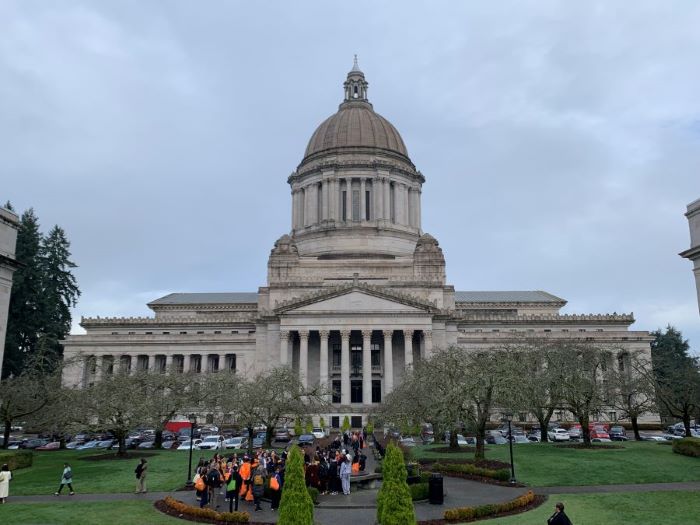Still Bridging the Gap Between Student Needs and Resources
United Way of King County’s Bridge to Finish program helps ensure that local college students stay on the course en route to obtaining their degrees. The program includes 10 “Benefits Hubs” on King County community and technical college campuses that offer services such as one-time emergency grants, housing support, tax help, food pantries, and financial coaching.
United Way also successfully advocated for the passage of the Washington Legislature’s House Bill 1559 (the Student Basic Needs Act), which mandates that each institution of higher education has at least one benefits navigator to assist students in accessing public benefits, emergency assistance programs, and community resources.
These efforts work to address a college population that finds merely staying in school—much less remaining focused while they’re enrolled—challenging. According to a report by the Conversation, 53% of community college students said they left school due to the cost of tuition and fees and 48% said they left due to cost-of-living expenses.
United Way’s Bride to Finish work is successfully addressing those concerns. An evaluation conducted by MDRC (an organization that develops education and social programs for the impoverished) and the Washington Student Achievement Council found that participants who accessed Benefits Hub services were 25% more likely than students of similar backgrounds to persist and complete their college education.
Emily Portillo, United Way Benefits Hub senior program manager, said that students’ needs persist as COVID relief funding has dried up.
According to a report by the Conversation, 53% of community college students said they left school due to the cost of tuition and fees and 48% said they left due to cost-of-living expenses.
“When House Bill 1559 passed, it provided funding for 3/4th full-time employees at each of the public two- and four-year institutions. There are 34 community and technical colleges and there are six four-year universities,” Portillo said. “The state Board for Community and Technical Colleges oversees the implementation for the community and technical colleges and the Washington Student Achievement Council oversees the implementation for the public universities.”
As part of the implementation of the Student Basic Needs Act, Portillo said, “We are training campus navigators as they come on board. We hosted an orientation for navigators in October with four half-day training sessions. Now we are continuing that training; folks have identified that food needs are something they are interested in or have challenges with. We want to make sure we provide our expertise to address those needs through training.”
The Student Basic Needs Act was modeled after United Way Benefits Hubs, and our training sessions are crafted on the model as well. “For orientation, we train them on providing basic needs services to students,” Portillo said. “How do you structure your conversation with students? How do you apply a racial equity lens? How do you get the word out?
“For one particular session, we focused on access to food,” Portillo said. “We talked about basic food, SNAP [Supplemental Nutrition Assistance Program], and supporting students in accessing SNAP—including who is eligible, what is the application process, and what are ways you can connect students to SNAP. We share best practices.
“We brought in experts specific to King County who talked more broadly about the emergency food system, including what is currently happening, what opportunities schools can take, and what it looks like for a food bank to work with a college,” Portillo added. “Our North Seattle College Benefits Hub is currently working with the University District Food Bank, and they have a robust relationship and model that they were able to share with folks.”

Portillo said that along with decreased COVID resources has come more awareness on college campuses about available resources such as Benefits Hubs. With that increased awareness has come greater demand. She said that many food banks that previously partnered with college campuses are cutting back “because they are stretched thin in their own ways, and they can’t take on college hunger.”
Portillo said that United Way has partnered with Cascadia Produce to purchase fresh fruits and vegetables near their expiry date at a discount for college campuses. But she says that that approach is not sustainable.
“We are really hoping that there will be additional grants that we can support schools in applying for and new partnerships that they can leverage so we are not doing the purchasing,” Portillo said.
Recently, United Way Emerging Leaders 365 volunteers partnered with United Way staff to supply 100 meal kits to our Benefits Hub location at Shoreline Community College. Portillo said that the project has now been scaled to where each of our Benefits Hub locations will receive 100 meal kits.
“Meal kits are really important right now,” said Portillo, who said that there’s an upcoming volunteer opportunity to assemble and supply meal kits for Green River College. Log on to our volunteer page to find out when such opportunities are available.


Comments